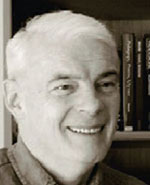
“The Senate fence measure was embodied in an amendment offered by Senator Jeff Sessions, Republican of Alabama, who borrowed from the poet Robert Frost. ‘Good fences make good neighbors,’ he said. ‘Fences don’t make bad neighbors.'” — New York Times, 17 May 2006
What Senator Sessions knows is of no interest to me. It must be vast. But what he doesn’t know about Robert Frost is of abysmal proportions, a stark and humiliating metaphor for all that is wrong in the United States today. And this is catastrophic.
Good fences make good neighbors? Please Senator, try not to be absurd. Don’t make me cry out loud! Are you serious to assert on the floor of the United States Senate that Robert Frost suggested such a claim? And did not one of the senators from Massachusetts rise to the poet’s defense? After all, Frost hailed from those parts — a Harvard man, too. Don’t make me laugh out loud! Sessions quotes Frost out of complete context, negating the meaning of Frost’s great poetic expression of tolerance, friendship, and rationality. But what can one expect? The senators are politicians, and they are true to their nature, like the hardness of stones, for example.
Using a quote from a Frost poem to drop yet another stain on the reputation on the United States, this time walling out Mexico, is a gross malfeasance by Sessions and by all those who stood to pass the “Senate fence measure.” The poem, “Mending Wall,” was written by Frost in 1914, but his ideas are as fresh today as “spring mending-time.” Obviously Sessions was too busy keeping America secure to read the poem through. But this is in keeping with the longstanding tradition of our politicians not reading anything through . . . like the Patriot Act, for example. But surely Sessions could have taken the trouble to read at least the first line!
“Something there is that doesn’t love a wall. . . .”
See how ridiculous your statement is, Senator? Would you care to issue a retraction?
Below is the complete poem. I defy anyone to find a kind word in it about the human value of building walls or fences. Dark-minded, stone-age thinkers who never venture a thought beyond their own closed-in minds might, but of course Frost skewers them. And that’s the point of the poem. Read it and weep for your country.
Something there is that doesn’t love a wall,
That sends the frozen-ground-swell under it,
And spills the upper boulders in the sun,
And makes gaps even two can pass abreast.
The work of hunters is another thing:
I have come after them and made repair
Where they have left not one stone on a stone,
But they would have the rabbit out of hiding,
To please the yelping dogs. The gaps I mean,
No one has seen them made or heard them made,
But at spring mending-time we find them there.
I let my neighbor know beyond the hill;
And on a day we meet to walk the line
And set the wall between us once again.
We keep the wall between us as we go.
To each the boulders that have fallen to each.
And some are loaves and some so nearly balls
We have to use a spell to make them balance:
“Stay where you are until our backs are turned!”
We wear our fingers rough with handling them.
Oh, just another kind of outdoor game,
One on a side. It comes to little more:
There where it is we do not need the wall:
He is all pine and I am apple orchard.
My apple trees will never get across
And eat the cones under his pines, I tell him.
He only says, “Good fences make good neighbors.”
Spring is the mischief in me, and I wonder
If I could put a notion in his head:
“Why do they make good neighbors? Isn’t it
Where there are cows?
But here there are no cows.
Before I built a wall I’d ask to know
What I was walling in or walling out,
And to whom I was like to give offence.
Something there is that doesn’t love a wall,
That wants it down.” I could say “Elves” to him,
But it’s not elves exactly, and I’d rather
He said it for himself. I see him there
Bringing a stone grasped firmly by the top
In each hand, like an old-stone savage armed.
He moves in darkness as it seems to me,
Not of woods only and the shade of trees.
He will not go behind his father’s saying,
And he likes having thought of it so well
He says again, “Good fences make good neighbors.”(Robert Frost, 1917)
I have a proposal of my own. I know whom we should be, in Frost’s words, “walling in and walling out.” Try Congress for example! And Senator Sessions in particular, for “He moves in darkness as it seems to me.”
 James C. Ryan, USMA, 1962 |
James C. Ryan is a co-founder of West Point Graduates Against The War. He is a graduate of the United States Military Academy, class of 1962. Ryan spent five years in the army artillery with assignments in the United States and Europe. Thereafter a businessman, he subsequently became a writer. He divides his time between Istanbul, Turkey where he lives, and New York City where he teaches in the summer at Columbia University. Father of four, Jim has eight grandchildren.
